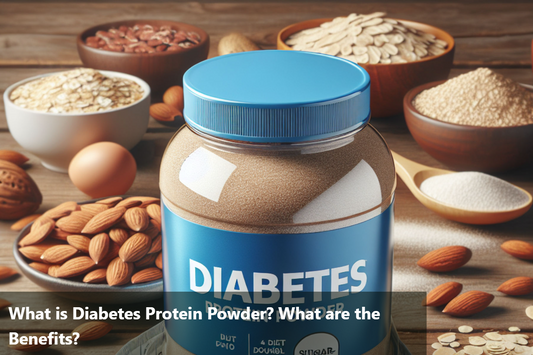Undoubtedly, diabetics need to modify their diet all the time, but these modifications differ from Type 1 to Type 2 diabetic patients. Managing one's carb intake with various other alterations in the diet can, up to a large extent, aid diabetes management and act beneficial for them, but is the low-carb diet the same for both types?
What is Type 1 (T1d) vs Type 2 diabetes (T2d)?
Whether be it Type 1 or Type 2, in both cases the blood glucose levels are high in the body and the resulting consequences are harmfully tagged along with serious complications. But certain lifestyle modifications are essential for better diabetes management. Let's look at the primary differences between Type 1 Vs Type 2 diabetes.
Type 1
- Type 1 diabetes is an autoimmune disease that is genetic.
- In Type 1 diabetes, a person experiences a complete loss of insulin production.
- This diabetes type destroys the insulin-producing cells known as 'beta cells'. This means the body cannot make insulin anymore.
- Type 1 diabetes is popularly known as 'juvenile-onset diabetes' as it mainly shows up in children and young adults. The symptoms of this type appear in the early stages.
- It requires daily insulin injection and an external source of insulin.
Type 2
- Type 2 diabetes is mostly lifestyle-related.
- Here, the insulin doesn't work properly or isn't produced enough. In Type 2, the pancreas doesn't use insulin as it should.
- The symptoms of Type 2 diabetes are easily missed and difficult to spot as they tend to appear and progress slowly.
- Type 2 can be prevented or reversed with healthy changes in lifestyle, such as diet modification, exercises, healthy weight and activeness.
Type 1 diabetes and low-carb diet
A low-carb diet is not only beneficial for Type 2 but also may be beneficial for Type 1 diabetes. Though Type 1 requires lifelong insulin injections, a healthy lifestyle with sufficient protein and healthy dietary fats can play a key role in managing it better.
Hypoglycemia is a constant risk for T1D. Therefore, the optimal daily carb intake varies in Type 1 diabetes and has to be timed with daily insulin injections. Also, one has to take into consideration the lifestyle factors such as physical activity.
In their diet, when a diabetic consumes more carbs, the body requires more insulin. So if a Type 1 diabetic is taking a lot higher carbs, then he or she might need to inject more and more insulin. This way, carbs have a direct relation to Type 1 diabetes. Thus, lowering the level of carbs in the diet helps patients with Type 1 diabetes.
According to the book, Dr Bernstein's diabetes solution T1D can lower blood sugar levels by slowly eating digested carbs along with small doses of insulin. This is known as the "law of small numbers".
Though carb restrictions have been mainly focused on people diagnosed with T2D, it demonstrates positive results for T1D as well.
Backed by research in 2016, a randomized controlled trial (RCT) found that people who practised 75 -100 grams of carbs for 12 weeks showed a significant reduction in HbA1c and blood glucose levels. As compared to people who practised standard carb counting.
Another trial research in 2021 showed a low-carb diet when combined with high protein led to less glycemic variability and hypoglycemia.
Concerns regarding low-carb diet in T1D
- A low-carb diet for T1D also comes with certain concerns. Very low-carbohydrate diets can push into nutritional ketosis, a normal physiological state with normal blood sugars and insulin levels. This state can be confused with diabetic ketoacidosis.
Diabetic Ketoacidosis (DKA) is a condition resulting from a severe lack of insulin in the body and highly elevated blood sugars. It is an extremely life-threatening condition that drastically increases blood ketone levels and needs immediate attention. Monitoring blood glucose levels and taking insulin as required can prevent DKA.
- Lean or underweight type diabetics can lose weight on a low-carb diet thus, Type 1 diabetic people who are not overweight need to increase other sources of macronutrients in their diets such as protein and healthy fats.
- People with no knowledge of carb restrictions and how it works are always advised to eat low carb under the professional guidance of a doctor and dietician. Under the guidance of a doctor, one can adjust insulin doses and can understand his or her body chemistry well.
The bottom line
Fortunately, with a low-carb diet, frequent testing and proper insulin dosage, one can manage Type 1 diabetes and have control over the overall diabetes management. With healthy shifts, Type 1 diabetes sounds no longer like an unsolved puzzle.
References:
https://pubmed.ncbi.nlm.nih.gov/26965765/
https://pubmed.ncbi.nlm.nih.gov/33769666/
This Blog post is an initiative by DiabeSmart, to provide accurate and Nutritionist / Doctor approved information related to Diabetes. DiabeSmart is India's first Food brand designed specifically for Diabetics, that has been clinically tested on Diabetics and Pre-Diabetics to deliver 55% - 70% lower Sugar spikes. DiabeSmart is part of Lo! Foods - India's leading brand for Everyday Functional Health foods.











